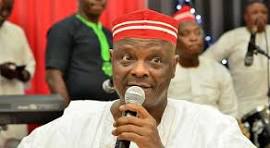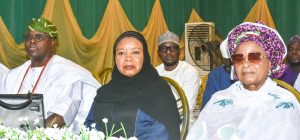
By Kalu Okoronkwo
As His Excellency, Senator Rabiu Musa Kwankwaso, PhD, FNSE, marks his 69th birthday, Nigeria pauses to reflect on the enduring legacy of one of her most pragmatic and visionary political leaders. Kwankwaso’s life story remains a rare study in purposeful leadership, focused vision, and people-centered governance.
His rise from the dusty streets of Kano to the corridors of power in Abuja embodies the resilience of a reformer committed to building a Nigeria anchored on justice, inclusion, and development.
The 69th birthday of the National Leader of the New Nigeria People’s Party (NNPP) and its presidential candidate in the 2023 general elections, is more than a milestone; it is a celebration of legacy and a moment of reflection on how one man’s character, convictions and capacity for service continues to dominate Nigeria’s political and development discourse.

His birthday celebration drew dignitaries and political associates from far and wide who converged on his hometown, Kwankwaso Village in Madobi Local Government Area of Kano State. In demonstration of his passion for education and youth development, a major feature of the event was the inspection of ongoing academic activities and recognition of staff and students of the Nafisatu College of Nursing Sciences, established by Senator Kwankwaso in 2019.
Also Read: 2027: Can Obi return with the fury of the masses?
During the tour, the former Governor of Kano State announced his intention to upgrade the School of Nursing Sciences to a full-fledged medical university with a view to expanding opportunities for young people, especially women, to pursue advanced medical and health related studies. He also commended the Kano State Government, under the leadership of Alhaji Abba Kabir Yusuf, for sponsoring community midwives at the institution; a move he said plays a vital role in strengthening healthcare delivery, particularly in rural communities.
“From Kano to every corner of Nigeria, we are equipping community midwives to deliver life and hope where it matters most,” Kwankwaso affirmed.
Born on October 21, 1956, in Kwankwaso Village, Madobi Local Government Area of Kano State, Rabiu Musa Kwankwaso’s early years were steeped in the values of discipline, hard work, and community service. Raised in a modest but principled environment, he learned early the importance of education, fairness, and humility, values that would later define his leadership principles of pragmatism, inclusiveness, and service to humanity.
His educational journey from Wudil Craft School to Kaduna Polytechnic, and later to postgraduate studies in the United Kingdom and India, exposed him to diverse perspectives that sharpened his technical and managerial competence.
As a civil engineer and later as a public servant, Kwankwaso displayed an uncommon blend of technical precision and political foresight; a combination that would distinguish him in public life.
Also Read: NNPP: Kwankwaso’s brinkmanship and the making of a national political brand.
His early exposure to governance, first as a civil servant and later as Deputy Speaker of the House of Representatives in the short-lived Third Republic, gave him a firsthand understanding of Nigeria’s complex socio-political landscape. It was during these formative years that Kwankwaso began articulating a leadership philosophy built on equity, discipline, and national cohesion.
Kwankwaso’s emergence as Governor of Kano State in 1999 marked the beginning of a transformational era. Leading one of Nigeria’s most populous and politically conscious states demanded not just vision but competence, and Kwankwaso delivered on both.
His administration revolutionized the education sector in Kano State, introducing free education at all levels and launching an ambitious foreign scholarship programme that sent thousands of Kano indigenes abroad to study in fields critical to national development. This bold investment in human capital remains one of the most comprehensive educational interventions in Nigeria’s subnational history.
Infrastructure development was another cornerstone of his governance. From urban renewal projects that transformed Kano’s skyline to the construction of hospitals, roads, and water facilities, Kwankwaso turned policy into tangible development. His government’s emphasis on accountability, inclusivity, and efficiency set a new benchmark for state governance.
Perhaps most notably, his leadership birthed the Kwankwasiyya Movement, a political and social philosophy that blended service, discipline, and empowerment. Through youth engagement, vocational training, and leadership mentoring, Kwankwaso transformed governance into a participatory process.
Under his watch, Kano became a model for focused development, proving that governance rooted in competence can uplift communities and inspire hope.
Beyond Kano, Kwankwaso’s national influence grew steadily. As Minister of Defence under President Olusegun Obasanjo, he brought the same discipline and strategic focus to national security management. As a Senator of the Federal Republic and later National Leader of the NNPP, Kwankwaso has remained a consistent advocate of inclusive governance and developmental federalism.
In an era where political allegiances shift with the wind, his consistency has earned him respect across divides. His politics is neither defined by ethnic rhetoric nor partisan bitterness; rather, it is anchored on principled pragmatism and a deep sense of responsibility to the nation.
At the heart of Kwankwaso’s political ideology lies the Kwankwasiyya Movement, symbolized by the iconic red cap. To his followers, the red cap represents discipline, humility, and service; the ethos of a movement that transcends politics and speaks to civic rebirth.
The Kwankwasiyya philosophy champions education, empowerment, and equity as tools for social transformation. It is a movement that sees every youth not as a political pawn but as a potential leader. For Kwankwaso, education remains the great equalizer, a belief reflected in his lifelong commitment to expanding access to learning and skills acquisition.
His vision is clear: A Nigeria where governance is not about power or privilege, but about people and progress.
In a nation where credibility is often sacrificed on the altar of convenience, Kwankwaso stands apart as a man of conviction and consistency. His political record is unmarred by scandal. His reputation for discipline, integrity, and prudence has earned him admirers even among opponents.
He is widely regarded as a leader who “plays politics without bitterness”, a statesman who prioritizes dialogue over division. His calls for peace, justice, and national unity continue to resonate, particularly at a time when Nigeria faces deepening polarization. Across ethnic, religious, and political lines, Kwankwaso commands respect as a unifier with a clear sense of purpose.
As he turns 69, Kwankwaso’s reflections are bound to be those of a man fulfilled yet still driven by service. To many of his protégés and admirers, he remains a mentor whose personal discipline and administrative excellence set an enduring example of what leadership should be.
From engineers who benefited from his scholarship schemes to political mentees shaped by his leadership ethos, the testimonies of those touched by Kwankwaso’s vision are countless. His influence extends beyond politics; it is moral, intellectual, and generational.
During the birthday ceremony, Professor Saleh Ngaski, Chairman of the Governing Council of Nafisatu College of Nursing Sciences, lauded Kwankwaso’s investment in education and youth empowerment, describing it as “his most remarkable humanitarian and developmental contribution.”
Similarly, Alhaji Adamu Yahaya Maikifi praised Kwankwaso’s extraordinary political sagacity and doggedness, calling him “a titan of Nigeria’s political scene whose leadership and vision have been pivotal to the establishment and growth of the Kwankwasiyya Movement.”
In a show of solidarity, a delegation of Igbo leaders, led by Chief S. N. Okeke, former Chairman of the Police Service Commission and current Chairman of the Igbo Elders Consultative Forum, alongside Dr. Okwesilieze Nwodo, former Governor of Enugu State and former National Chairman of the PDP, visited Kwankwaso to felicitate him. Dr. Nwodo described him as “a national asset whose ideas on education, infrastructure, and governance continue to inspire public discourse.”
Kwankwaso at 69 is not just a celebration of longevity; it is an acknowledgment of a legacy that continues to inspire faith in the power of good governance. His life reaffirms that competence, capacity, and credibility are not abstract ideals but attainable standards in public leadership.
As Nigeria navigates its complex path toward progress, leaders like Kwankwaso remind the nation that reform is possible when guided by vision, courage, and integrity. His journey from Kano to the national stage is a story of purpose, discipline, and service that endures.
In celebrating Rabiu Musa Kwankwaso at 69, we celebrate not just a man, but a movement, a continuing symbol of competence, hope, and credible leadership for a nation still searching for her true north.
Kalu Okoronkwo is a communications strategist, a leadership and good governance advocate dedicated to impactful societal development and can be reached via kalu.okoronkwo@gmail.com




My brother recommended I might like this website. He was entirely right.
This post truly made my day. You can not imagine simply how much time I had spent for this information! Thanks!
Hello! I just wish to offer you a huge thumbs up for your great info you have got here on this post.
I am returning to your blog for more soon.
The clarity here is outstanding.
rpv8gd
iwin – nền tảng game bài đổi thưởng uy tín, nơi bạn có thể thử vận may và tận hưởng nhiều tựa game hấp
专业构建与管理谷歌站群网络,助力品牌实现全域流量的强势增长。谷歌站群
Khám phá thế giới giải trí trực tuyến đỉnh cao tại MM88, nơi mang đến những trải nghiệm cá cược thể thao và casino sống động.
Tham gia cộng đồng game thủ tại Go88 để trải nghiệm các trò chơi bài, poker phổ biến nhất hiện nay.
Với giao diện mượt mà và ưu đãi hấp dẫn, MM88 là lựa chọn lý tưởng cho các tín đồ giải trí trực tuyến.
Khám phá thế giới giải trí trực tuyến đỉnh cao tại MM88, nơi mang đến những trải nghiệm cá cược thể thao và casino sống động.
Đến với J88, bạn sẽ được trải nghiệm dịch vụ cá cược chuyên nghiệp cùng hàng ngàn sự kiện khuyến mãi độc quyền.
I appreciate, cause I found just what I was looking for. You’ve ended my four day long hunt! God Bless you man. Have a nice day. Bye